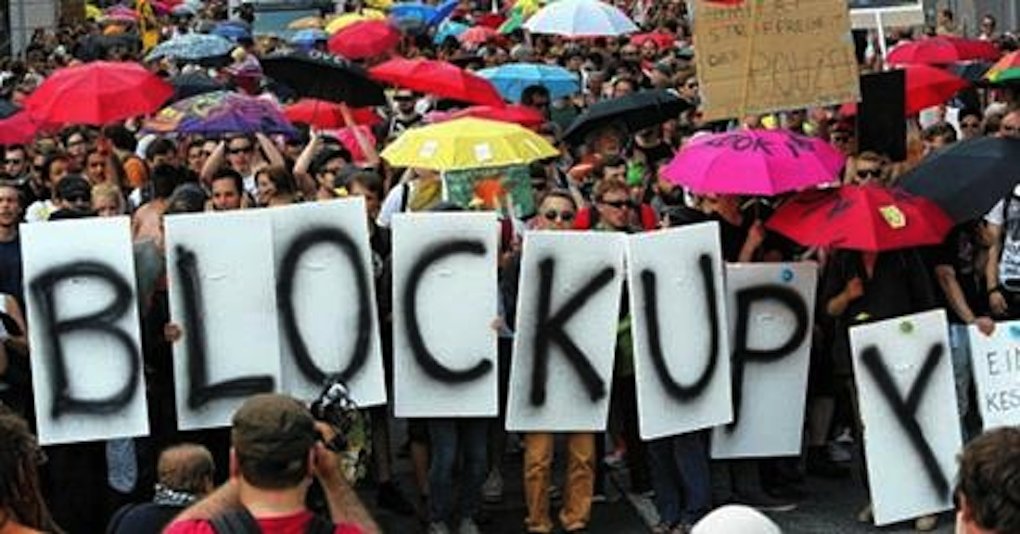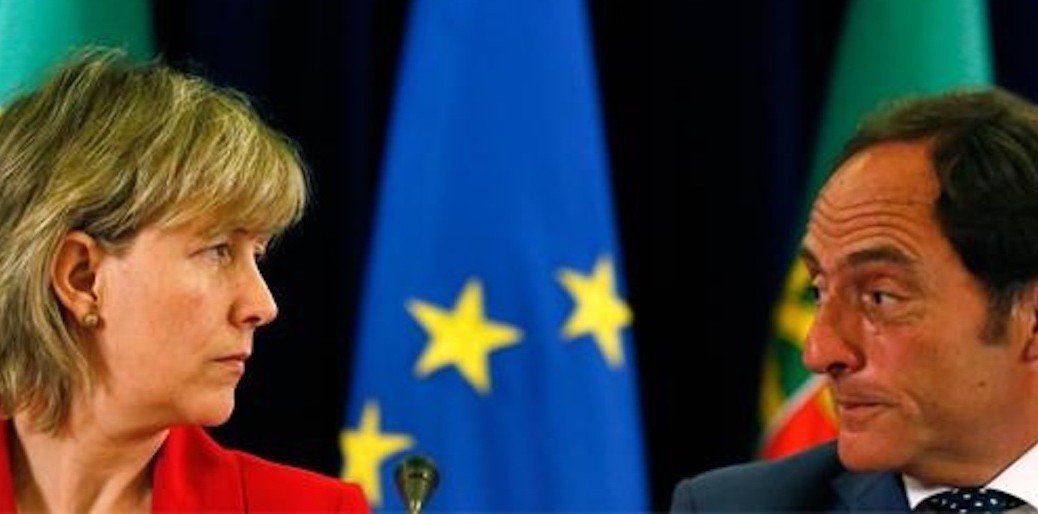On October 31st the centre of the city of Buenos Aires was put on lockdown by the police, the military, and secret services. Martial law provisions were to continue for three days. US aircraft carriers lay offshore on the river plate and the airspace over the city closed. 40,000 police were on the streets of the city to protect twenty top government representatives and a few multilateral bankers; men and women like to refer to themselves as ‘leaders’.
(c) http://www.criticatac.ro/lefteast/the-g20-and-the-counter-protests-in-argentina/
Continue reading The G20 and the Counter-Protests in Argentina
Category Archives: Debt
Multinationals suing Countries; Argentina’s Debt
The following article is written by Tony Phillips an Irish and Argentine economist specialising in the build up to and the consequences of excessive national debt. He is Editor (with Nobel Laureate Joseph Stiglitz and former Argentine minister for economics Roberto Lavagna) of his most recent book: “Europe on the Brink; Debt Crisis and dissent in the European Periphery” which is published in English, Spanish and Portuguese. (Ya también disponible en Castellano bajo el título “
The article gives an account of Argentina’s woes in defending itself in what was then 37 tribunal cases taken against Argentina in the World Bank arbitration court called the ICSID (International Centre for Settlement of investor Disputes). The ICSID is an Investor-State Dispute Settlement tribunal (SDS) that is it is a tribunal where private corporations can sue governments (via Bilateral Investment Treaties) for claims in investment losses (including future profits). The European Union (EU) is currently trying to make member states vulnerable to such law suits by signing trade and investment agreements such as TTIP which have ISDS built into them.
Continue reading Multinationals suing Countries; Argentina’s Debt
A Europe Without Solidarity: Debt Crisis and the Failure of the Neoliberals
(Interview by Ramor Ryan published in the US journal “Toward Freedom”)
A Europe Without Solidarity: Debt Crisis and the Failure of the Neoliberals; Written by Ramor Ryan, Published: 29 September 2015
Interview with Tony Phillips, editor of Europe on the Brink: Debt Crisis and Dissent in the European Periphery (Zed Books)
The current European sovereign debt crisis has the capacity of jeopardizing the whole European Union project with devastating social consequences. Tony Phillips’ new book Europe on the Brink investigates the root causes of the crisis, critiques its mismanagement spearheaded by the European Central Bank, the EU Commission and the International Monetary Fund (collectively called the Troika), and suggests alternatives. Bringing together eight leading critical economists and sociologists, including Nobel Laureate Joseph Stiglitz, Europe on the Brink portrays a European Union that is increasingly authoritarian and non-democratic, where the rule of law and the well-being of the people are brushed aside in the interests of balancing the books and imposing a neoliberal agenda. Continue reading A Europe Without Solidarity: Debt Crisis and the Failure of the Neoliberals
Greece the Eurogroup & the Referendum

The word Referendum comes from the Latin referre (to bring back) and demos is Greek for the people as a political unit; demos is the root of the word Democracy; so a referendum brings a decision back to the people. As representative democracies European States hold elections to choose their governments giving elected representatives a mandate to represent their political choices. The Greek people chose Syriza to represent them in the broken institutions of a European Union in crisis; the Greeks chose to end Austerity. If representatives can’t make a political decision, because it is contrary to their mandate, the decision can be brought back to the demos in a referendum; or at least that is how things used to work.
Welcome to post-crisis EU democracy.
Continue reading Greece the Eurogroup & the Referendum
The Secret Bank Bailout; who exactly are the Eurozone taxpayers funding and why?
The documentaries from Harald Schumann wocomo documentaries are some of the best one I have seen on the European Sovereign Debt Crisis and is an excellent resource for education in all of the nations involved. For those interested in distributing this film please see the following link at the newdocs site in Germany: http://www.newdocs.de/wp-content/uploads/2013/03/Flyer_The-Secret-Bank-Bailout.pdf
Continue reading The Secret Bank Bailout; who exactly are the Eurozone taxpayers funding and why?
Book Review (Germany)
Review: Europe on the brink;
Debt crisis and dissent in the European periphery
Bettina Müller (translation from the German original by the Author)
Austerity measures, Troika, PIIGS… Daily the newspapers tell us about the European crisis which has gone on for almost seven years now; one which should have been fixed a long time ago. It seems gratuitous to note that the current crisis management, spearheaded by the European Central Bank, the EU Commission and the International Monetary Fund (collectively called the Troika) has not yielded the desired results. In fact, it has made the situation worse. While European Union institutions remain undemocratic; while the interests and well-being of European citizens is considered less important than the interests of private enterprise and the banks; and until financial markets are effectively regulated: this will not change. These are the conclusions reached by eight economic and sociologists, including Nobel Laureate Joseph Stiglitz, brought together by economist Tony Phillips in his book: Europe on the brink, debt crisis and dissent in the European periphery, published by Zed Books of London (2014).
Continue reading Book Review (Germany)
Austerity not an option
Roberto Lavagna, Buenos Aires, December 2014
Economic policies –and thus social policies too – are often presented as inevitable outcomes, when facing certain circumstances. Those who tend to support the inevitability of such responses are members of formal and informal coalitions –more precisely ‘powers’ – which bring together multilateral organizations (the IMF and the World Bank) with local orthodox economic and conservative actors with both international and local financial interests (in the wider sense of this term).
Continue reading Austerity not an option
El “ajuste” no es una opción
Roberto Lavagna, Buenos Aires, Diciembre 2014
Muchas veces se presentan a las políticas económicas -y por ende sociales- como hechos inevitables frente a determinadas circunstancias. Quienes tienden a sostener esta teoría de lo “inevitable” responden a coaliciones formales o informales -en realidad “poderes”- que reúnen a organismos multilaterales (FMI, Banco Mundial) + sectores conservadores ortodoxos locales + intereses ligados a las finanzas, en el sentido amplio, locales e internacionales.
Continue reading El “ajuste” no es una opción
Media Selection: Book Launch, Lisbon with Mario Soares
“Se o governo não quer renegociar dívida deve ser mudado”

Lusa 07 Jun, 2014
Se o governo não quer renegociar dívida deve ser mudado;
Rafael Marchante, (c) Reuters
O economista e investigador irlandês Tony Phillips disse à Lusa que, “em nome da democracia”, se o Executivo de Lisboa não quer renegociar a dívida, os portugueses devem mudar de governo.
“Se o governo (de Portugal) diz que não se pode renegociar a dívida o melhor, é mudar de governo. Não se pode ter um governo a tomar as suas próprias decisões sobre desenvolvimento e, o mais importante, é que não se pode ter o governo a ficar com empresas privadas que entraram em colapso e que foram nacionalizadas, forçando assim a dívida dos privados aos cidadãos. Isso não é democracia”, disse Tony Phillips, coordenador do livro “A Europa à beira do abismo”, editado em Portugal.
Continue reading Media Selection: Book Launch, Lisbon with Mario Soares
La advertencia de Argentina acerca de la deuda soberana
Escritor: Tony Phillips, Buenos Aires,
Traductora: Annette Ramos, Washington D.C.
 El monto de las emisiones de deuda soberana de todas las arcas nacionales del mundo constituye un enorme mercado financiero concentrado en unas pocas divisas principales y jurisdicciones legales. El dinero que circula en estos mercados es la deuda pública (soberana) del mundo. Estos bonos o títulos son típicamente adquiridos por el sector privado, pero son en última instancia saldados (tanto el principal como los intereses) por los contribuyentes locales en los estados prestatarios. Los inversores (compradores de bonos) se benefician de los pagos periódicos de intereses y del reembolso eventual de la suma principal capital. Los bonos se consideran una inversión más segura que aquella en las empresas comerciales públicas, y a menudo los fondos de pensiones compran bonos.
El monto de las emisiones de deuda soberana de todas las arcas nacionales del mundo constituye un enorme mercado financiero concentrado en unas pocas divisas principales y jurisdicciones legales. El dinero que circula en estos mercados es la deuda pública (soberana) del mundo. Estos bonos o títulos son típicamente adquiridos por el sector privado, pero son en última instancia saldados (tanto el principal como los intereses) por los contribuyentes locales en los estados prestatarios. Los inversores (compradores de bonos) se benefician de los pagos periódicos de intereses y del reembolso eventual de la suma principal capital. Los bonos se consideran una inversión más segura que aquella en las empresas comerciales públicas, y a menudo los fondos de pensiones compran bonos.
O al menos así es como las cosas solían funcionar. Continue reading La advertencia de Argentina acerca de la deuda soberana








